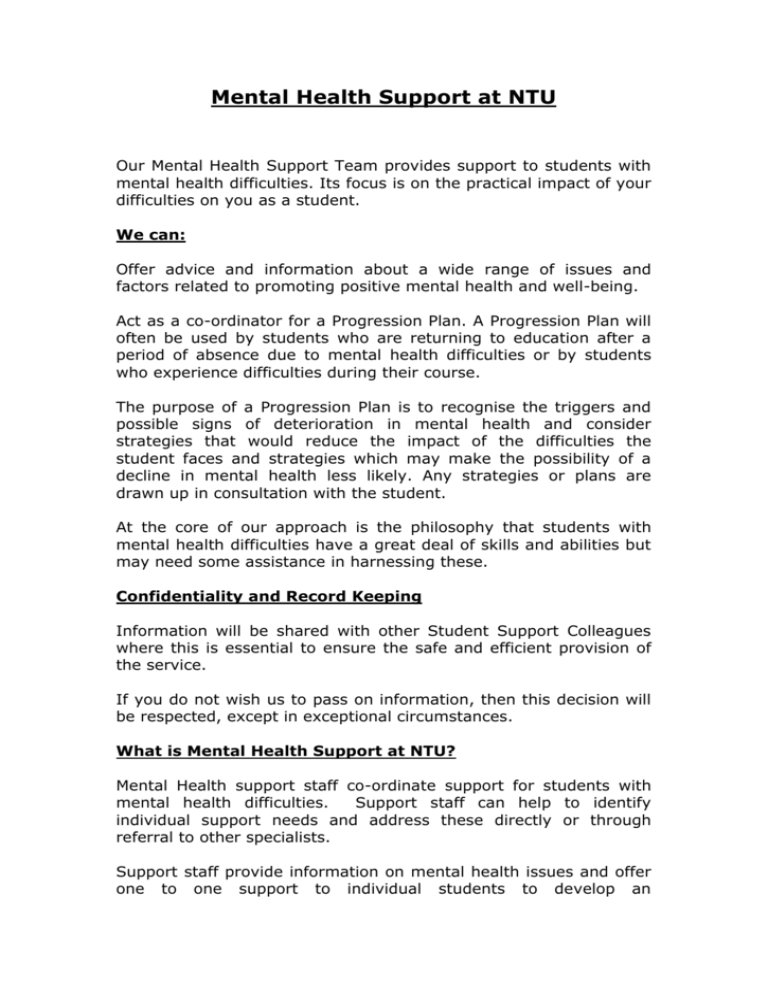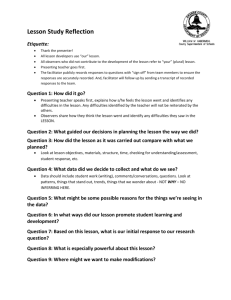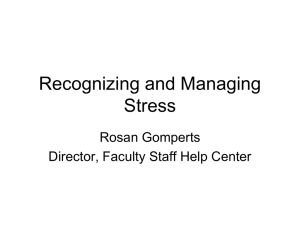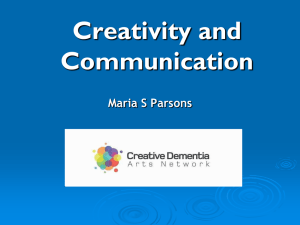Mental Health Support at NTU
advertisement

Mental Health Support at NTU Our Mental Health Support Team provides support to students with mental health difficulties. Its focus is on the practical impact of your difficulties on you as a student. We can: Offer advice and information about a wide range of issues and factors related to promoting positive mental health and well-being. Act as a co-ordinator for a Progression Plan. A Progression Plan will often be used by students who are returning to education after a period of absence due to mental health difficulties or by students who experience difficulties during their course. The purpose of a Progression Plan is to recognise the triggers and possible signs of deterioration in mental health and consider strategies that would reduce the impact of the difficulties the student faces and strategies which may make the possibility of a decline in mental health less likely. Any strategies or plans are drawn up in consultation with the student. At the core of our approach is the philosophy that students with mental health difficulties have a great deal of skills and abilities but may need some assistance in harnessing these. Confidentiality and Record Keeping Information will be shared with other Student Support Colleagues where this is essential to ensure the safe and efficient provision of the service. If you do not wish us to pass on information, then this decision will be respected, except in exceptional circumstances. What is Mental Health Support at NTU? Mental Health support staff co-ordinate support for students with mental health difficulties. Support staff can help to identify individual support needs and address these directly or through referral to other specialists. Support staff provide information on mental health issues and offer one to one support to individual students to develop an understanding of their mental health and in forming coping strategies. Mental health support staff can also provide indirect support such as liaising with statutory agencies, GPs and course tutors. What Support can we provide? We work with individual students on issues which commonly arise as a result of mental health difficulties such as: Concentration and memory difficulties Motivational difficulties Organizational and time management skills Ritualised, or obsessive and compulsive behaviour Anxiety problems and panic attacks Avoidance Isolation from peers and academics Low self-esteem Assertiveness and confidence problems Sleeping difficulties Self-harm, suicide attempts, self-destructive behaviour Unusual, bizarre, possibly delusional beliefs Ruminating – constantly worrying about situations, events and people Lethargy Paranoia Procrastination Perfectionism Unhealthy eating patterns Lack of exercise Difficulty managing finances Ensuring a lifestyle conducive to effective study. How Is This Provided? We aim to assist students to find productive ways to deal with the various challenges associated with studying at Higher Education level. Some of the solutions identified may point to: Liaison with course teams Request for alternative assessment arrangements Referral to statutory services to try to ensure that students receive appropriate care and treatment Planning a realistic approach to study and formulating plans that structure the approach to the work Keeping a healthy balance of other elements in life Liaison with Student Financial Services for funding issues Developing strategies for progression on the course. Communication Mental Health support staff may be more able to provide appropriate and effective support through liaison with university employees or external agencies. This will, at all times, be done with your awareness. Examples of situations where communication departments/agencies has been useful: with other Feedback to the Mental Health Coordinator or the Head of Student Support Services on emerging issues related to individual casework. Liaison with other members of Student Support Services. E.g. Student Financial Support, Counselling service. Consultation with an identified member of academic staff to assist that person to understand the academic impact of an individual student’s experiences of mental health difficulties. Liaison with external agencies to ensure that students receive appropriate care and treatment. Some Issues to Think About Prior To Accessing Mental Health Support Consider some of the particular difficulties you experience. You may find you have a number of immediate concerns; try to identify priorities. What are your current coping strategies? What self-help or support has been useful to you? If you take medication, does this have an impact on your ability to undertake your education? Consider how we might work together with tutors. Consider how we might work together with GP’s and/or Community Mental Health Services. Consider how we might work together with family or friends. Find out your current workloads and deadlines, and bring these to initial meetings. Consider how long and how often it would be helpful to meet with a Mental Health Officer. Queries about Mental Health Support For more information, please contact our Mental Health Support Coordinator: Student Services Centre (City Site) 0115 848 2085 mental.health@ntu.ac.uk A range of self-help guides are also available at all the Student Centres: City: Newton Central Court Clifton: Student Centre, George Eliot Brackenhurst: Student Centre, Bramley Building







